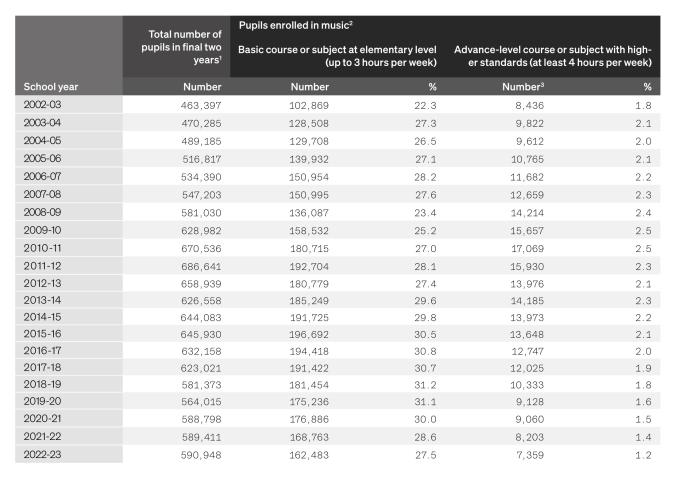In the school year 2022-23, the state schools in Germany counted around 591,000 pupils in final two years of grammar school. According to the KMK, 162,483 of them chose music as basic course or subject at elementary level, which corresponds to a share of 27.5 %. The proportion of pupils choosing music as a basic course reached a peak of around 31% in the school years 2018-19 and 2019-20.
In advance-level music courses or music subjects with higher standards the number of pupils was most recently 7,359 (1.2 %). The decline in the number of pupils in the advanced-level music courses, which began about ten years ago, continued in the school year 2022-23.

Compared to artistic subjects in the field of art, design and craft, pupil enrolment in music is low. In 2022-23, more than half of the prospective graduates had art lessons with a basic requirement level (315,963), the proportion was almost twice as large as in music. Compared to music, more than five times as many pupils took art subjects at a higher level.
The basic courses in religion and ethics/philosophy also had more pupils than music. On the other hand, in advance-level courses, more students took music classes than in these subjects.

Note
The final two years of grammar school are qualification phases Q1 and Q2 for grammar schools with eight grade levels (G8), as well as grades 12 and 13 for those with nine grade levels (G9). To take into account the differing treatment of the final years of grammar school in Germany’s states, the Standing Conference of the Ministers of Education and Cultural Affairs (KMK) no longer speaks of ‘basic’ and ‘advanced’ courses, but of subjects with basic or higher standards (‘Vereinbarung zur Gestaltung der gymnasialen Oberstufe in der Sekundarstufe II’, KMK Resolution of 7 July 1972 in the version of 16 June 2016). At least two subjects with higher standards are mandatory in all states; a number of states have defined three or even four such subjects.
Footnotes
-
Total number of pupils according to information supplied by the Federal Statistical Office. From the 2008-09 school year a distinction has been made between grammar schools with eight years (G8) and nine years (G9). The figures cover both G8 and G9 grammar schools as well as integrated comprehensive schools, Waldorf schools and special schools.
-
Number of pupils in the individual courses according to information supplied by the KMK. The figures include G8 and G9 grammar schools as well as integrated comprehensive schools, Waldorf schools and special schools.
-
Since the 2011-12 school year music has no longer been taught in Bavaria as a subject with higher standards.
Source information
Compiled and calculated by the German Music Information Centre from various issues of ‘Belegte Kurse in der gymnasialen Oberstufe der allgemeinbildenden Gymnasien und Integrierten Gesamtschulen’, ed. Secretariat of the Standing Conference of the Ministers of Education and Cultural Affairs of the Länder of the Federal Republic of Germany; Calculation of the total number of pupils in final two years from: Federal Statistical Office (Destatis), Genesis-Online, Datenlizenz by-2-0, and various annual issues of the Federal Statistical Office’s Subject series 11, series 1.


